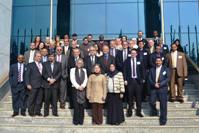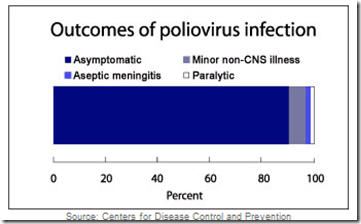hat tip Ian Mackay
A family cluster of Middle East Respiratory Syndrome Coronavirus infections related to a likely unrecognized asymptomatic or mild case
<hr id="authorabs00051">Abstract
Background
Ninety confirmed cases of Middle East Respiratory Syndrome Coronavirus (MERS-CoV) have been reported to the World Health Organization. We report the details of a second family cluster of MERS-CoV infections from Riyadh, Saudi Arabia.
Methods
We present the clinical, laboratory and epidemiological details of 3 patients from a family cluster of MERS-CoV infections.
Results
The first patient developed respiratory symptoms and fever 14 days after admission to hospital for an unrelated reason. He died 11 days later with multi-organ failure. Two of his brothers presented later to another hospital with respiratory symptoms and fever. MERS-CoV infection in the latter 2 patients was confirmed by reverse transcriptase polymerase chain reaction testing. All 3 patients had fever, cough, shortness of breath, bilateral infiltrates on chest x-ray, thrombocytopenia, lymphopenia and rises in serum creatinine kinase and alanine transaminase. No hospital or other social contacts are known to have acquired the infection. It appears that the index patient in this cluster acquired MERS-CoV infection whilst in hospital from an unrecognized mild or asymptomatic case.
Conclusion
MERS-CoV acquisition from unrecognized mild or asymptomatic cases may be a more important contributor to ongoing transmission than previously appreciated.
A family cluster of Middle East Respiratory Syndrome Coronavirus infections related to a likely unrecognized asymptomatic or mild case
- Ali S. Omrani<sup>a</sup><sup>, </sup>
 ,
, - Mohammad Abdul Matin<sup>b</sup><sup>, </sup>
 ,
, - Qais Haddad<sup>c</sup><sup>, </sup>
 ,
, - Daifullah Al-Nakhli<sup>d</sup><sup>, </sup>
 ,
, - Ziad A. Memish<sup>e</sup><sup>, </sup>
 <sup>, </sup>
<sup>, </sup> ,
, - Ali M. Albarrak<sup>a</sup><sup>, </sup>

- <sup>a</sup> Consultant Infectious Diseases Physician, Division of Infectious Diseases, Department of Medicine, Prince Sultan Military Medical City, Riyadh, Saudi Arabia
- <sup>b</sup> Consultant Physician, Division of Internal Medicine, Department of Medicine, Prince Sultan Military Medical City, Riyadh, Saudi Arabia
- <sup>c</sup> Consultant Infectious Diseases Physician, Department of Infection Control, Security Forces Hospital, Riyadh, Saudi Arabia
- <sup>d</sup> Director of Infection Prevention and Control, Department of Infection Prevention and Control, Prince Sultan Military Medical City, Riyadh, Saudi Arabia
- <sup>e</sup> Deputy Minister of Health for Public Health, Ministry of Health, Director WHO Collaborating Center for Mass Gathering Medicine, Professor, College of Medicine, Alfaisal University, Riyadh 11176, Kingdom of Saudi Arabia
<hr id="authorabs00051">Abstract
Background
Ninety confirmed cases of Middle East Respiratory Syndrome Coronavirus (MERS-CoV) have been reported to the World Health Organization. We report the details of a second family cluster of MERS-CoV infections from Riyadh, Saudi Arabia.
Methods
We present the clinical, laboratory and epidemiological details of 3 patients from a family cluster of MERS-CoV infections.
Results
The first patient developed respiratory symptoms and fever 14 days after admission to hospital for an unrelated reason. He died 11 days later with multi-organ failure. Two of his brothers presented later to another hospital with respiratory symptoms and fever. MERS-CoV infection in the latter 2 patients was confirmed by reverse transcriptase polymerase chain reaction testing. All 3 patients had fever, cough, shortness of breath, bilateral infiltrates on chest x-ray, thrombocytopenia, lymphopenia and rises in serum creatinine kinase and alanine transaminase. No hospital or other social contacts are known to have acquired the infection. It appears that the index patient in this cluster acquired MERS-CoV infection whilst in hospital from an unrecognized mild or asymptomatic case.
Conclusion
MERS-CoV acquisition from unrecognized mild or asymptomatic cases may be a more important contributor to ongoing transmission than previously appreciated.


Comment